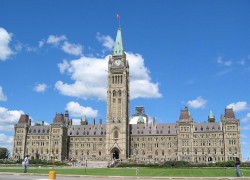 THUNDER BAY – If that adage ‘you reap what you sow’ is true, then Canadian polticians have planted a field of anger, and are reaping a bumper crop of negativity. A Nanos Research Survey on the impressions that Canadians have of the federal political parties shows a significant level of cynicism towards all parties. Looking at these numbers, realistically none of the parties hold the image high ground.
THUNDER BAY – If that adage ‘you reap what you sow’ is true, then Canadian polticians have planted a field of anger, and are reaping a bumper crop of negativity. A Nanos Research Survey on the impressions that Canadians have of the federal political parties shows a significant level of cynicism towards all parties. Looking at these numbers, realistically none of the parties hold the image high ground.
Canadians were asked to pretend that each federal political party was a person and to describe the personality of each using one word.
The Nanos Research Survey reports, “More than one in ten used the words “untrustworthy” (14.4%) and “conservative” (12.9%) to describe the Tories. Positive words used to describe the Conservatives included “good/good choice” (9.1%), “trustworthy” (6.4%), “strong/powerful” (5.3%) and “intelligent” (4.0%)”.
The NDP was described as “socialist” by a noticeable proportion of Canadians (13.3%). One in ten believed the party is “caring” (10.2%) and “good” (10.0%) while others said it was “bad/incompetent” (10.1%). A number of Canadians also saw the NDP as a “new” party (10.0%).
Nearly two in ten Canadians used the words “bad/incompetent” (18.4%) and “untrustworthy”(16.2%) to describe the Liberals, while one in ten said the Party was “good” (11.5%). Other attributes associated with the Liberals included “competent” (6.8%), “progressive”(5.8%) and “strong/powerful” (5.1%).
Nearly two in ten Canadians associated the Green party with the words “environment/eco-friendly/green” (16.7%). The party was also thought to be “unrealistic/naive” (14.7%) and many believed it was “not well known” (11.1%).
When Quebecers were asked the word they would use to describe the personality of the Bloc, more than one in ten said the party is “useless” (15.4%) as well as “narrow-minded/one-sided” (13.0%). Many Quebecers also described it as a “separatist/independent” party (11.7%) while others felt it was “aggressive” (10.7%). A few believed the party is “good” (4.0%).
The current wave is based on a representative random sample of 1,002 Canadians, conducted online by Nanos Research between April 13th and 14th, 2012.
